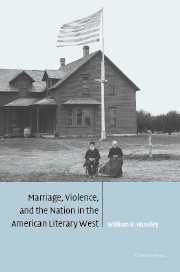Book contents
- Frontmatter
- Contents
- List of illustrations
- Acknowledgments
- Introduction
- 1 Western unions
- 2 Turner's rhetorical frontier
- 3 Marrying for race and nation: Wister's omniscience and omissions
- 4 Polygamy and empire: Grey's distinctions
- 5 Unwedded West: Cather's divides
- 6 Accident and destiny: Fitzgerald's fantastic geography
- 7 Promises and betrayals: Joan Didion and Wallace Stegner
- Afterword
- Notes
- Index
1 - Western unions
Published online by Cambridge University Press: 22 September 2009
- Frontmatter
- Contents
- List of illustrations
- Acknowledgments
- Introduction
- 1 Western unions
- 2 Turner's rhetorical frontier
- 3 Marrying for race and nation: Wister's omniscience and omissions
- 4 Polygamy and empire: Grey's distinctions
- 5 Unwedded West: Cather's divides
- 6 Accident and destiny: Fitzgerald's fantastic geography
- 7 Promises and betrayals: Joan Didion and Wallace Stegner
- Afterword
- Notes
- Index
Summary
The United States is unique in the extent to which the individual has been given an open field.
Frederick Jackson Turner, “The Problem of the West” (1896)The nomadic, bachelor West is over, the housed, married West is established.
Owen Wister, preface to Members of the Family (1911)Is the Marlboro Man lonely? Answering this question demonstrates the social truth behind this icon of the antisocial western individual. If we answer yes, we imply that his solitude is neither desirable nor sustainable. If we answer no, we have yet kept company with him by believing in his contentment and admiring him for it. Whether we answer yes or no, we have put ourselves in the picture, animated him. Of course, we can also refuse to pose the question and consider it meaningless, in which case we kill him off. Indeed, he cannot live without us. His continuing life, manifest in a dying advertising campaign, attests to a deep contradiction in American beliefs and experience. Many Americans celebrate an individual in the landscape of the American West who never settled the West by himself or even much lived there in his grand isolation. He does not refer to himself in his individuality so much as to some need in those who believe in him; he is a social creation who embodies a profoundly asocial ideal.
- Type
- Chapter
- Information
- Publisher: Cambridge University PressPrint publication year: 2002

